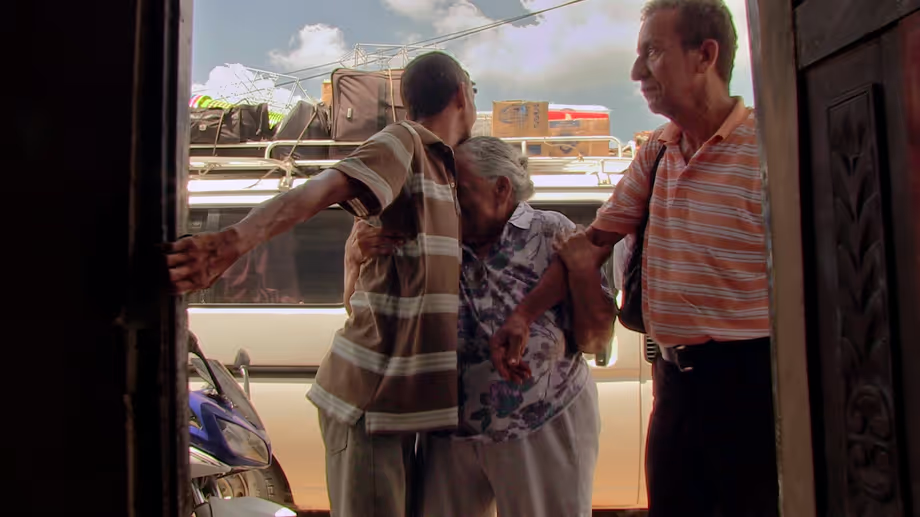La Casa De Mama Icha Discussion Guide Discussion Prompts
Discussion Prompts

STARTING THE CONVERSATION
Immediately after the film, you may want to give people a few quiet moments to reflect on what they have seen. You could pose a general question (examples below) and give people some time to themselves to jot down or think about their answers before opening the discussion.
Alternatively, you could ask each participant to use one word to describe one feeling the film brought up for them. After everyone has spoken, take a moment to recognize the range of feelings--some which are perhaps even contradictory--that the film has brought into the room. Then, you can ask 2- 3 volunteers to reference a specific scene that created their expressed feeling for them, or to elaborate on the feeling they expressed.
- If you were to share this film with one person you know, who would that be? And why would you want them to see it?
- Did this film generate any new thoughts, ideas, curiosities, or ask you to consider something you hadn't yet before considered?
- If you could ask anyone in the film a single question, whom would you ask? What would you ask; and why?
CARE AND CAREGIVING
- What are the social and economic benefits of caregiving work? Are there outcomes to caregiving work that are tangible and measurable? Think what you might say to a policy maker to advocate for more support services for caregivers.
- We see in the film that there is a strong sense of shared responsibility in Mama Icha’s family. Have you ever been in a caregiving role? If so, what made you feel supported? What online or in-person resources, groups, and services did you use to build community to support your caregiving work? What did you wish you had more of by way of support?
- What are the advantages of intergenerational care? What do children gain from being raised in an intergenerational family, with access to elders? How for example might Michelle Angela’s art and activism be informed by the fact that she grew up under the care of two generations of women in her family?
- Do you have experiences feeling cultural bias against elderly people in the United States? If you feel comfortable, share some of those experiences. After anyone who wishes to has shared, as a group, discuss:
- What are some of the emotional, physical, psychological, or material consequences of such bias?
- What do you think are some factors responsible for such bias?
- What can be done to address these hurtful biases and create a culture and society which honors elders? In your responses, address what can be done by individuals, communities, businesses, and government.
- What are ways that families and medical personnel can listen to and honor the needs and agency of elderly people? Have you had experience making elder care choices in which you had to make a decision between your wishes and those of your family member? What did you prioritize in making those choices?
- Consider that leaving one’s home country is of great sacrifice, so much so that emigres may harbor a dream of return for decades. Consider also the many economic and social benefits that remittances can confer upon home countries. Given this, do you think remittance-receiving nation states, like Colombia, have a responsibility to provide material care to their diasporic communities by way of health insurance or social security? Discuss.
- In the next few years, there will be more people who need care in the US which means more and more people will be thrust into caregiving roles. Are our systems in the US designed to care for caregivers? What bureaucratic or material challenges have you or someone you know faced in serving as a caretaker? What barriers have they faced in accessing government or other types of support?
- Have you had to have difficult conversations about dying with loved ones? What resources or people did you turn to to help you have those conversations?
RELATIONSHIP TO HOME
- Think of any times in your life you’ve felt, like Mama Icha, that you felt torn between different homes or displaced from somewhere that felt like home.. What emotional, psychological, or material consequences did that have for you and your loved ones? How did you eventually resolve any of the tensions or difficulties this situation created for you or your loved ones?
- How do you define “home”? What are the various factors -- emotional, psychological, sensory, material -- that connect us to a home place?
- The film touches on a sense of belonging to one’s homeland. Did the film complicate your understanding of belonging? Are there times when you yourself, like Mama Icha, felt your sense of belonging was disrupted, and if so, what strategies did you use to restore a sense of belonging? What social, interpersonal, and/or material supports do you think are important to have in place for people to restore that sense of belonging?
- How might it feel to not be connected to a home land? Can people forge relationships to land when such land is contested or a site of trauma?
- Have you ever returned to somewhere you once felt at home and everything felt different from how you’d imagined it? If so, what had changed and why?
- Have you ever moved away from somewhere that felt like home carrying with yourself the conviction or confidence that you’d return, but didn’t ever end up returning? What got in the way of you returning?
- Mama Icha sustains two homes across national borders. What does the film suggest about ways transnationalism can complicate or exacerbate family issues? How does distance (especially across borders) impact communication and caregiving within families?
- Do you believe people have a right to migrate? Why or why not?
- Do you believe people, communities, or entire nations have a right to remain in a place they feel they belong or in which they have generations of history?
- Consider this latter question in the context of gentrification: do communities have a right to remain and be protected from being priced out of their own neighborhoods and homes? If so, what kinds of policies do you think would help protect communities’ right to home? (One example of a protection might be in requiring developers to sign Community Benefits Agreements).
CONSEQUENCES OF MIGRATION
- What does the film teach you about immigration experiences that you didn’t know before?
- Distance can fracture families and create more problems than resolutions. How might our public conversations about immigration change if we didn’t just think about migration as an exchange of labor but as a complex set of material choices and psychological consequences?
- It’s often understood that migration is a benefit to the immigrant but how do host communities also benefit from the cross-cultural exchanges made possible through immigration?
- How have you personally benefited from people’s decisions to immigrate to the United States? Think of the goods, services, cultural resources, entertainment and/or ideas you encounter regularly and how much of that is owed to immigrant families.
- In what ways is migration into the US related to policies of the United States? What does the film reveal about this interplay?
- Throughout the 20th century in the United States, there’s been a tension between the US’s rhetoric about immigration as a site of refuge -- the Statue of Liberty’s “give me your huddled masses” -- and restrictive immigration policies (Chinese Exclusion Act of 1823 for example). We’re seeing this still today: humanitarian language employed while policies are in place to deport thousands before they can access their legal right to seek asylum. As a person living in the United States, how do you reconcile these contradictory ideas for yourself? How can the US or European nations be simultaneously a hub for welcoming refugees while also setting boundaries given finite resources?
- What does the film suggest about challenges people might face in returning to their country of origin after years living abroad? How might those challenges be exacerbated if returning to unstable political or economic situations?
- Many immigrants into the US arrive with accrued financial stability or high skills. This is drastically different from the portrait of migration that is most prominent in the news--of people moving to the United States to seek resources. Why do you think public discourse tends to focus on one type of immigration rather than the other?
- Increasingly, people of means from higher-income nations are moving to the global South, something like gentrification on a global scale. What might be some of the consequences of this type of migration on local economies, local cultures, and environment? Will people be displaced from their own home countries? Should there be limits on this type of migration precisely because of some of its ramifications?
REMITTANCES AND INTERDEPENDENCE
- What are your thoughts on Mama Icha’s decision to return to Colombia to live in the house she built? Why do you think this house was so meaningful to her? Have you ever felt so connected to a house? If so, why?
- How might poverty in any one country affect all of us? Why should we be concerned with poverty in countries not our own?
- Often, migratory people are working long hours within difficult working conditions: meat packing plants; farmworking; construction. Given the ends to which people go to earn a paycheck, what do you think accounts for the fact that portions of these earnings are sent back to home to support people’s families?
- Have you ever shared your earnings with members of your family (besides your children)? If so, what led you to do so and how did you feel?
- Scholars and researchers observe a distinction between Western and Eastern worldviews: Western worldviews value independence while Eastern worldviews value interdependence. Have you experienced either or both? And what do you think are the advantages and disadvantages of either worldview?
- What do you believe are the most significant factors in developing generational wealth?
- The United Nations has invested a great deal of time and energy in supporting and facilitating remittances. Why do you think that might be?

